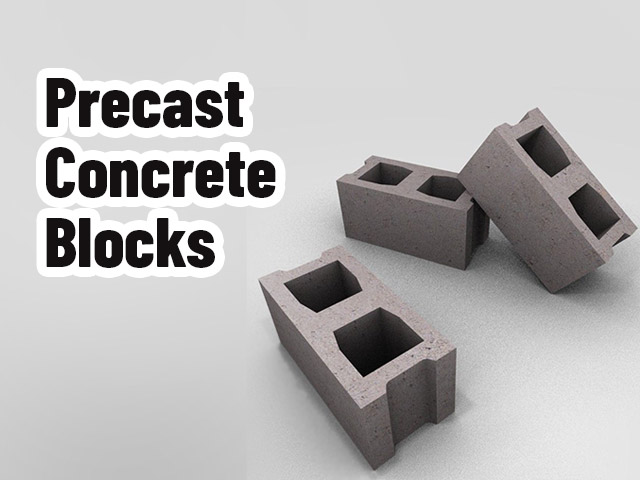
Precast concrete block is the term used for shaped and hardened concretes before being brought to the construction site. It is prepared in a production facility equipped with advanced technology and suitable conditions and then brought to the construction site.
Precast concrete block includes cement, aggregate, sand and water. These products, which can be produced by hand or automatic machines, can be manufactured in different shapes and sizes with hollow or full. Hollow blocks can be shown as the most common type.
What is Precast Concrete Block?
Precast concrete blocks generally have certain standard sizes. Its length varies between 400 mm and 600 mm. Its height is 100 or 200 mm. Its width can be 50, 75, 100, 200, 250 and 300 mm.
Precast concrete block, which is widely used especially in construction, is a product with high strength. It is especially used in wall construction because it is resistant to environmental factors such as rain and fire. During the construction of the building, it is important to follow the block making procedures as well as hand workmanship.
The procedure to be followed during production is as follows:
- Stacking and mixing of materials
- Adding water to the mixture
- Molding process is done manually or by automatic machines.
- Removing products from molds
- Waiting covered products for 24 hours
- Curing for 7 days
If you are looking for precast concrete blocks for sale or if you have contacted the nearest precast concrete block manufacturer, we recommend that you make sure that the production procedure is followed completely.
Materials Used in Production
These blocks are manufactured in different sizes and sizes for use in various structures. Stretcher, corner, rounded edge, foundation pillar, jamb and concrete floor are examples.
In a typical block, concrete, powder cement, water, sand and pebbles are used. A typical block weighs between 17 kg and 20 kg. As it has high sand percentage and low gravel and water percentage, it is very hard.
As an alternative to sand and gravel, granulated coal or slags can be used. These blocks are called slag blocks. It is a type of block with high strength and sound and heat insulation. It weighs between 12 kg and 15 kg.
Blocks produced by using clay or slate instead of sand and gravel are expressed as light blocks. A typical lightweight block has a weight ranging from 10 kg to 13 kg.
Advantages of Precast Concrete Block
- It has very high compressive strength.
- Its resistance to fire and wear is good.
- It has high stability.
- It offers the opportunity to finish the construction more quickly.
- Logistics is easy because the hollow blocks are low in weight.
- The hollow blocks can be filled with concrete. In this way, earthquake resistance is increased.
- Hollow units provide better heat and sound insulation than those filled.
